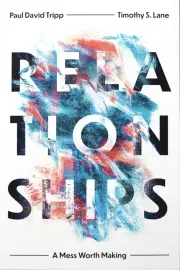Relationships
Lane and Tripp begin by asserting our brokenness and our need for the reconciling grace of God both in relation to ourselves and in relation to others. They tell us why it’s worth bothering with our relationships in the first place when it can be tempting at times to walk away. After all, who hasn’t felt after a tricky exchange, ‘Right, that’s it. I’m backing off!’ But since God has bothered with me, I have no option but to relate with the people around me. Vertical relationship with God demands horizontal relationship with others. It is only in community that we truly reflect the image of God who is Himself in community: Father, Son and Holy Spirit.
A whole gamut of possible relationships is incorporated in the book. Marriage receives a fair bit of attention but relationships between parents and children, colleagues, friends, acquaintances, peers and strangers are all covered.
Louise Roques
Strong Meat
Lane and Tripp begin by asserting our brokenness and our need for the reconciling grace of God both in relation to ourselves and in relation to others. They tell us why it’s worth bothering with our relationships in the first place when it can be tempting at times to walk away. After all, who hasn’t felt after a tricky exchange, ‘Right, that’s it. I’m backing off!’ But since God has bothered with me, I have no option but to relate with the people around me. Vertical relationship with God demands horizontal relationship with others. It is only in community that we truly reflect the image of God who is Himself in community: Father, Son and Holy Spirit.
A whole gamut of possible relationships is incorporated in the book. Marriage receives a fair bit of attention but relationships between parents and children, colleagues, friends, acquaintances, peers and strangers are all covered.
Louise Roques
Relationships
Do you ever feel the temptation to withdraw from other people and the problems they bring? Well this book will encourage you not to give up on people. God has sought us out in the Gospel in the midst of our sin, and God has called us to seek out others to serve them too. The trials that will inevitably result will help us to grow as well.
Stephen Ayre
Don't give up on people
Do you ever feel the temptation to withdraw from other people and the problems they bring? Well this book will encourage you not to give up on people. God has sought us out in the Gospel in the midst of our sin, and God has called us to seek out others to serve them too. The trials that will inevitably result will help us to grow as well.
Stephen Ayre
Relationships
In Relationships: A Mess Worth Making by Timothy Lane and Paul David Tripp, I can confidently say it is a book that every Christian should read on the threefold basis of theology, applicability, and accessibility.
THEOLOGY
We all need to hold and seek out sound, biblical theology. While it’s true that the term “biblical” has been bandied about to an unhealthy and unhelpful degree in the contemporary Western Church, at times even employed as a weapon, it is equally unhealthy and unhelpful to dismiss the term because its true meaning is glorious: adherence to the “norming norms” of Holy Scripture in matters of faith and practice. Relationships is such a book.
Lane and Tripp begin by conducting a half–dozen chapters of theological cartography, defining and describing the lay of the land according to the Bible and in relation to human experience. Not content to relegate relationship issues to the categories of mere conflict management or the untouchable here there be dragons danger zone, the authors instead point to the highest peak on the horizon, that of the redemptive purposes God intends for all relationships. Their message is soaked in a robust theology of grace, which does not minimize hurt on one hand, nor views relationships through rose–colored glasses on the other.
APPLICABILITY
We all participate in relationships. That inalienable reality (for you really do have to be an alien in order to avoid contact with humanity in all its fallen forms, since you are one of those fallen life forms) is why this book is applicable to everyone. We all sin, we all have agendas, we all worship, we all talk, we all struggle to manage time and money, we are all tempted at times to doubt Gods provision. The previous sentence contains half the chapter titles found in the book, by the way.
A third of the way through the book, I began to communicate via thought–waves with the authors: Tim and Paul, this theology of grace is all very nice, but we cant always overlook all offenses. Some just have to be dealt with. They didnt let me down, but they did take a few more chapters before dealing with some of the practicalities of conflict. This is as it should be: a house needs to be framed before stairs to the upper floors are built.
ACCESSIBILITY
We need to read books we can understand. I’m aware of the seeming redundancy of this statement, yet hasnt everyone tried to read a book that has come highly recommended by a source we trust only to find that it fails completely to resonate with our experience and/or that it is written for an audience with a much different vocabulary than we ourselves possess? This isn’t the case with Relationships. In fact, it is such an accessible book and is filled to the gills with so much rich teaching that I hereby assume that everyone who reads this review will read the book, and will henceforth expend no more keystrokes on the superb content of this fine book.
Finally, let me note that the book makes fairly heavy use of Eugene Petersons Bible paraphrase The Message and some of Peterson’s other works besides. Donald Miller’s Blue Like Jazz also makes an appearance with one entire paragraph from Miller quoted approvingly, and C.S. Lewis pops in and out fairly regularly. If you don’t approve of these authors or disdain The Message paraphrase, then you may want to read this book while holding your nose. For even if the authors quoted aren’t to your taste, the rest of the book is a veritable banquet of grace and truth.
Mark Tubbs
Recommended
In Relationships: A Mess Worth Making by Timothy Lane and Paul David Tripp, I can confidently say it is a book that every Christian should read on the threefold basis of theology, applicability, and accessibility.
THEOLOGY
We all need to hold and seek out sound, biblical theology. While it’s true that the term “biblical” has been bandied about to an unhealthy and unhelpful degree in the contemporary Western Church, at times even employed as a weapon, it is equally unhealthy and unhelpful to dismiss the term because its true meaning is glorious: adherence to the “norming norms” of Holy Scripture in matters of faith and practice. Relationships is such a book.
Lane and Tripp begin by conducting a half–dozen chapters of theological cartography, defining and describing the lay of the land according to the Bible and in relation to human experience. Not content to relegate relationship issues to the categories of mere conflict management or the untouchable here there be dragons danger zone, the authors instead point to the highest peak on the horizon, that of the redemptive purposes God intends for all relationships. Their message is soaked in a robust theology of grace, which does not minimize hurt on one hand, nor views relationships through rose–colored glasses on the other.
APPLICABILITY
We all participate in relationships. That inalienable reality (for you really do have to be an alien in order to avoid contact with humanity in all its fallen forms, since you are one of those fallen life forms) is why this book is applicable to everyone. We all sin, we all have agendas, we all worship, we all talk, we all struggle to manage time and money, we are all tempted at times to doubt Gods provision. The previous sentence contains half the chapter titles found in the book, by the way.
A third of the way through the book, I began to communicate via thought–waves with the authors: Tim and Paul, this theology of grace is all very nice, but we cant always overlook all offenses. Some just have to be dealt with. They didnt let me down, but they did take a few more chapters before dealing with some of the practicalities of conflict. This is as it should be: a house needs to be framed before stairs to the upper floors are built.
ACCESSIBILITY
We need to read books we can understand. I’m aware of the seeming redundancy of this statement, yet hasnt everyone tried to read a book that has come highly recommended by a source we trust only to find that it fails completely to resonate with our experience and/or that it is written for an audience with a much different vocabulary than we ourselves possess? This isn’t the case with Relationships. In fact, it is such an accessible book and is filled to the gills with so much rich teaching that I hereby assume that everyone who reads this review will read the book, and will henceforth expend no more keystrokes on the superb content of this fine book.
Finally, let me note that the book makes fairly heavy use of Eugene Petersons Bible paraphrase The Message and some of Peterson’s other works besides. Donald Miller’s Blue Like Jazz also makes an appearance with one entire paragraph from Miller quoted approvingly, and C.S. Lewis pops in and out fairly regularly. If you don’t approve of these authors or disdain The Message paraphrase, then you may want to read this book while holding your nose. For even if the authors quoted aren’t to your taste, the rest of the book is a veritable banquet of grace and truth.
Mark Tubbs




